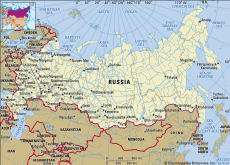

Population Decline in Russia
Russia’s population reached its maximum of 148 million people in the early 1990s (at the end of the Soviet era), and since then has declined to 142 million people. Russia is predicted to have further population decline to 111 million people by 2050, this is a decrease of more than 20%. On average, Russia loses 750,000 people per year.
Causes
High death rate – Russia has a very high death rate well above the world average at 15 deaths per 1000 people annually. This could possibly be due to the large number of alcohol related emergencies and deaths, which represent the majority of hospital visits.
Life expectancy – As a result of the high death rate the average life expectancy in Russia is quite low. Russian men have a life expectancy of only 59 whereas women have a much higher expectancy of 72. 1 in 3 Russian men die before retiring mainly due to alcoholism and consuming low quality illegal alcohol.
Low birth rate –Russia’s fertility rate is 1.3 births per woman, which is not high enough to support a stable population. The fertility rate must be 2.1 births per woman to maintain a stable population. The low birth rate could be due to the high rates of alcoholism and economic hardship.
Birth Rate compared to death rate - The birth rate is 10 births per 1000 people annually. When you compare this to the death rate of 15 deaths per 1000 people annually, it shows that Russia reduces by 5 people per 1000 people annually.
Abortion – In Russia, abortion is a common and popular method of birth control, stemming from the era of Soviet control. This keeps Russia’s birth rate low and there have been certain news reports that suggest that Russia has more abortions than live births. According to the BBC in 2003, ’13 terminations for every 10 live births’
Immigration – Immigration into Russia is low and there are high levels of emigration of skilled workers to Western Europe, mainly due to the promise of a better standard of living and higher wages.
Impacts
Economic Impacts
Low unemployment due to lack of people of working age.
By 2025, Russia will have labour shortages leading to an economic crisis.
The Russian Far East is depopulated and economically depressed, due to the fact that the state-controlled cities and production areas collapsed at the end of the Soviet era, meaning that there is little incentive for people to live in these barren lands à high levels of economically rational outmigration.
Number of universities in the country has decreased from 1115 to 200, due to a lack of graduates
Reduced foreign investment in Russia due to lower economic performance.
Increase in GDP per capita due to increased demand to supply of work eligible people.
Increasing numbers of retired Russians leading to a strain on the pension system.
Social Impacts
Universities have to fight for each applicant due to the decreasing number of high school graduates.
Plans to make 100,000 teachers unemployed because of the aging population and lack of children.
Increasing number of ethnic Muslims and decreasing numbers of ethnic Russians due to the natural decrease mainly occurring in ethnic Russians.
Russian armed forces have decreasing personnel numbers that could lead to radical military reform proposals.
Aging population.
Potential for the country to have a large majority of elderly people who contribute nothing to the economy as young people emigrate out of Russia.
Lack of vital workers for vital jobs in medicine and hospitals leading to a decrease in the effectiveness and efficiency of hospitals.
Loss of ethnic diversity as ethnic minorities in the far reaches of Russia decline in population.
Political Impacts
Weakening Russian national identity.
Increasing numbers of Chinese workers in the Russian Far East leading to a weakening of the region’s national identity threatening the region’s territorial integrity.
Population decline questions Russia’s status as a ‘great power’.
Instability in North Korea could lead to large numbers of refugees entering the Russian Far East, helping to reverse the negative effects of depopulation.
Russia will have reduced political and military power leading to territory losses in areas with international border disputes.
Environmental Impacts
Russia’s resource potential cannot be properly exploited, leading to a reduction in economic gains from resource extraction
image- https://www.britannica.com/place/Russia

0 Comment:
Be the first one to comment on this article.